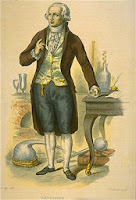A loyal reader of my blog, who praises my
way of popularizing science, rejects Christianity and seems bothered by the
fact that my articles imply that I am a Catholic. In a series of comments that he
wrote in one of my posts, he explains his arguments. I did not answer him there,
because of the length of his comments, which in total contain 3,346 words,
while my article only has 644 (more than five times less).
I think that this reader should be
classified as an agnostic rather than an atheist, as it’s possible to deduce
from the following words:
There is nothing stupid about rambling about the possible
existence of God and deciding "I'm going 100% that he does exist."
The universe is SO complex that, as long as there is no evidence to the
contrary, believing that there may be someone/something that
"designed" all this... cannot be dismissed as "stupid
thinking."
I think the reader's various criticisms
can be summarized by quoting the following words, which also appear in his
first comment:
The problem comes when we try to use all these reasonings
(which, in principle, speak of God as something completely ethereal and
impersonal) to try to validate the story of Jesus Christ, which seems to be the
goal.
Simple, right? The reader accepts my speaking
about God, but not about Jesus Christ. Apparently, he deeply resents my doing
so. I have named Jesus Christ in eight posts out of more than 450, although perhaps
my Christianity is also clear in posts where I don’t name him. And he accuses
me of trying to bring water to my mill (or sweeping home). This is a textbook
case of the ad hominem fallacy. As
we know, this fallacy (which in this case can be summarized as follows: you
say this because you are Catholic) can be answered in the same way: you
say that because you are an atheist, or agnostic, or whatever
corresponds.
Most of the comments of the reader (2092
words) are directed against the possibility of miracles, and in particular
against the miracle of Fatima, to which I have dedicated several
posts in this blog. I suspect that the reader thinks that his arguments
contradict what I said in those posts, but on the whole I think that he has just
provided a confirmation. I said this:
- Either
the event really occurred, i.e., the witnesses told the
truth.
- Either
the event did not take place, and the witnesses deliberately
lied.
- Or
the event did not take place, but the witnesses did not lie,
they were simply mistaken, or were the prey of a collective hallucination,
or some equivalent explanation.
And I added:
Skeptics say that the miracle was a collective hallucination, or
an optical effect due to the contemplation of the sun. Believers prefer the
first option.
 |
| G.K.Chesterton |
And what does the reader do? Assert that
the only valid alternatives to my trilemma are the second and the third. In
other words, what I had anticipated. An agnostic or an atheist must deny the
possibility of miracles, therefore must necessarily adopt the other two
alternatives. A believer has one more alternative, the first. (Catholics don’t
automatically accept everything we are told is a miracle, as proved by G.K.
Chesterton’s stories in the collection The Incredulity
of Father Brown.) Then those 2000 or so words confirm what I had
predicted.
There is also some reference to the other argument used usually by atheists to deny the existence of God: the problem of evil. In this regard he says:
If the planes that were going to hit the Twin Towers had frozen
in the air 20 meters from the impact... it would have been amazing, there would
have been no explanation of any kind and it would have been recorded on
video... However, that did not happen... And thousands of people died. And many
others suffered a mind-blowing psychological impact. It seems that miracles
only happen to do inconsequential nonsense.
This is the problem of human evil, to
which the usual response is to point out that we are trying to blame God for
the evil that men do. Or as Mark Twain may have said: There are many scapegoats, but the most common is Providence.
In this specific case, God is blamed for not having performed a miracle to
prevent a barbaric human act.
It’s curious: some time before the reader
posted these comments in my blog, I had used similar arguments in a debate
about the existence of God between two artificial intelligences in my latestscience fiction novel: Operation Viginti.
The debate ends in a draw, which is what usually happens in this type of debate.
Reaching an agreement is almost impossible, for both sides start from different
axioms: one affirms that God exists, the other denies or questions it, so it’s
difficult to find a convincing argument.
Manuel Alfonseca




























